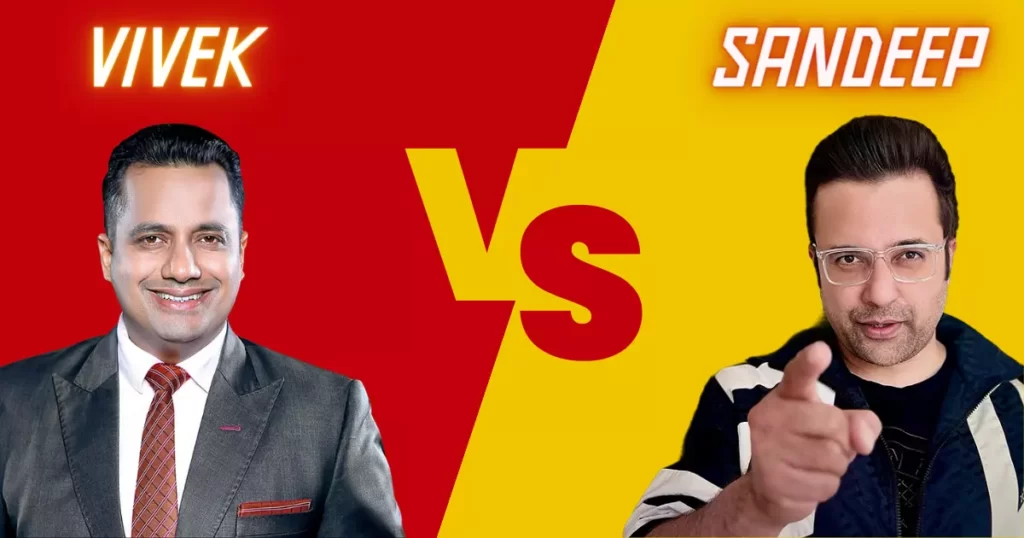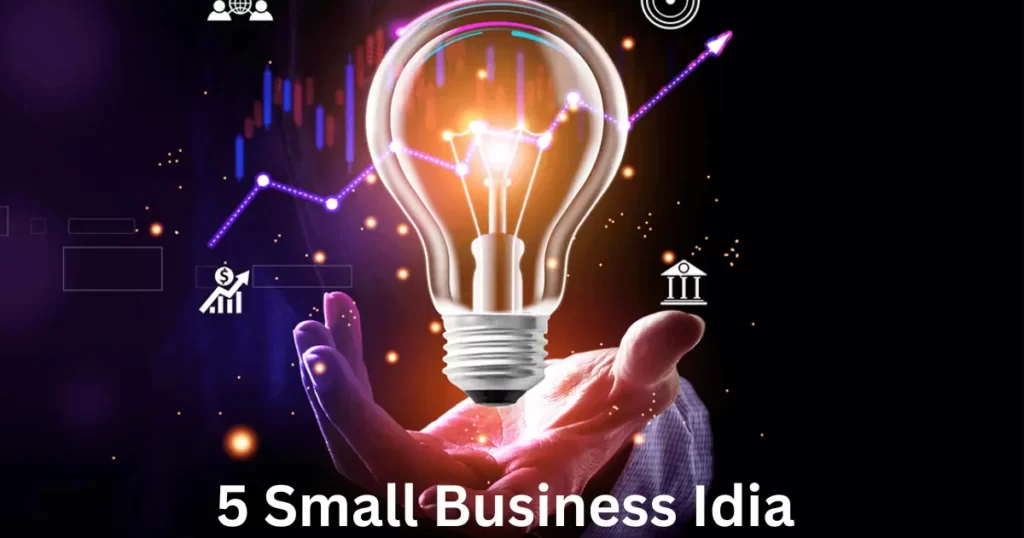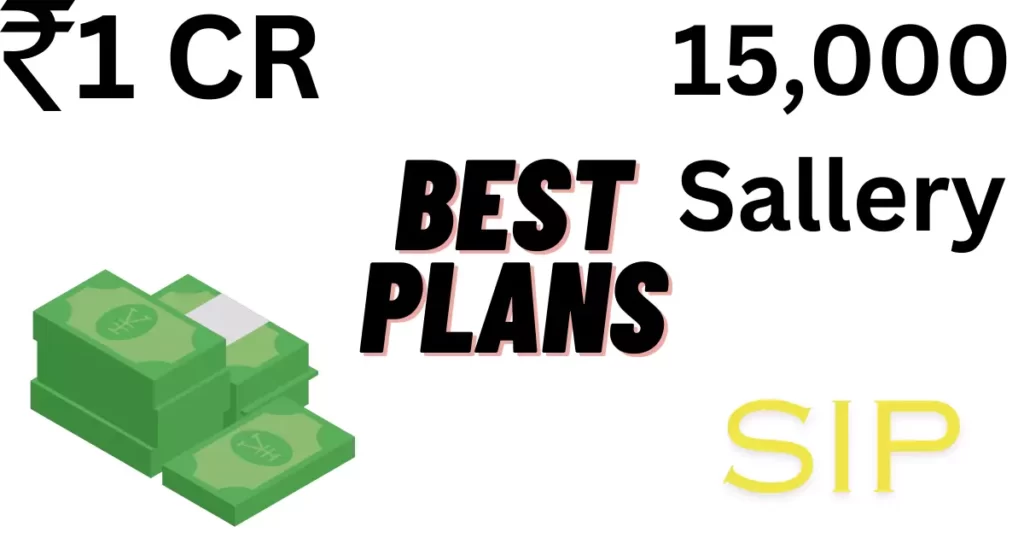The video by Sandeep Maheshwari has sparked the biggest controversy across YouTube, entangling Vivek Bindra in the controversy due to an alleged business scam.
In Sandeep’s video, a student accuses having taken a course from a prominent YouTuber that didn’t provide any value after purchase. When the student asked for a refund, they were told to sell the course to others. Interestingly, neither Vivek Bindra’s name nor his company was mentioned in Sandeep’s video. However, after Sandeep Maheshwari’s team received a legal notice from Vivek Bindra’s team, it was revealed that the video was about him.

Vivek Bindra, a significant YouTube figure with approximately over 21 million subscribers, was once a big name in the business world, with a massive following. But ever since the video surfaced and the legal notice was sent, Sandeep Maheshwari’s comment section and various places on YouTube have seen people unsubscribing from Vivek Bindra’s channel and boycotting his company, encouraging others to troll the hashtag.
But what really is the scam? Is the world being scammed, or is it a mistake in a small business model? Are all business coaches like this? Is selling business courses wrong? How did this happen to millions of people, and why are they stuck in this mess? Moreover, what can we do to prevent such deceit in the future? Today, I’ll delve into the inside story of the business industry to discuss its problems, solutions, what to consider while buying courses, and the actual motive behind these occurrences. Lastly, as a business consultant, I’ll share the key lessons we can learn from this entire controversy.
We’ll discuss these topics:
- Who is Vivek Bindra, and how did he build such a huge business empire or network?
- The IBC model.
- Whether this whole controversy was a scam or a mistake in a business model.
In this entire controversy, will Vivek Bindra be able to bounce back? What should all the IBSC or anyone who has bought courses or completed them do? How valid is Sandeep Maheshwari’s stance in this controversy? Finally, we’ll learn three crucial lessons from this entire controversy.
Vivek Bindra’s Journey and Business Model
Vivek Bindra started his YouTube channel in 2013, creating videos on business, finance, sales, marketing, and many other topics. They provided a lot of information and conducted case studies. The three distinguishing features of his channel were high-quality content, offering content for free, and explaining everything in easy Hindi language. Due to these aspects, people loved him, and in a very short time, he became the owner of such a huge YouTube channel. He was a legend in his field and had appeared on Sandeep’s channel as well, showing a good friendship. So, let’s understand what happened.
When his fan following grew, after providing free content for a while, he decided to create and sell courses, starting with a ‘tree’ course. He organized events where he shared a lot of business knowledge with entrepreneurs, and people appreciated it, and everything was going great. However, he thought, ‘How much can I sell alone? I should build my network at an India level, and as everyone wants growth, I should have my office in every city with a team below, reaching my course to businessmen.’ There are two ways to do this: either build your network with your own money or transform it into a franchise network. Changing to a franchise network isn’t a mistake. Everything is going great.
The IBC Approach
His business model was simple: appoint a CP (Channel Partner) in every city who would manage that city. Under this channel partner, there would be a sales team named IBC (Independent Business Consultant). What were IBCs? These were individuals who understood business problems. Some people came, paid money, got registered under IBC, I would train them, make them Independent Business Consultants, and then they would meet businessmen, provide them with my business courses, and solve their problems. And this concept too had no problem until now.
Identifying the Mistakes in the Business Model
The course was there, and it had to be sold to businessmen. If this same thing continued and was followed, today we would have been discussing how he created an unprecedented business. But there was a mistake that led to such a huge controversy. What was that mistake? The wrong selection of IBCs. What did being an Independent Business Consultant mean? A person who understands business then takes training and sells courses to businessmen. For the success of such IBCs, it was essential that the person be a little aggressive, have some experience in business, or have some people in their circle who they could supply their product to. If such IBCs were available, they would sell the product, and it would be fun.
Consequences of Wrong Selections in the IBC Model
But even a farmer’s son in some village, a student in some school, a student in some college, if they saw this, they felt, ‘I can do this, I’ll become an IBC after learning, and I’ll earn.’ Now, in this expectation, neither did they have the experience, nor were they qualified, nor did they have that kind of education. But they still directly became IBCs. At that time, while making IBCs, it should have been thought that this poor person won’t be able to sell. He won’t understand business, nor will he sell it. There should have been criteria, but there were no criteria. Whoever wanted to become an IBC, everyone was made an IBC. That’s why those who were the right candidates earned, praised those who were not regretted, ‘I didn’t get what I expected.
Here, there’s a clarity that when we went to someone’s home to sell a course, we didn’t actually sell it; people came on their own and we made it happen with their money. Look, sir, when you are hiring someone for a job, you don’t employ just anyone, right? You filter and ensure the work suitability. That filtering was missing in our Independent Business Consultant (IBC) model. Hence, many joined, but no one could deliver.
Impact of Ill-Equipped IBCs
Now, this was a mistake, but the loss incurred wasn’t minimal; it was a substantial loss caused by another significant mistake. When those IBCs, who were school or college students, invested money in the course, they neither understood the business nor could they sell it. So, they thought they suffered a loss as their money was gone. Now, those who were affluent accepted it as a mistake, it didn’t matter much to them. But those who were financially tight, like a person who sold their bike or jewelry or broke their savings of many years to get the money, when they came, they wondered how they’d manage; some asked for refunds. Instead of refunds, they were told to bring in four or five more people and get a commission. This turned hundreds into thousands and thousands into lakhs.
Deviation from Business Intent
So, in conclusion, if you observe closely, there was a deviation here; a significant mistake altered the course. Instead of selling the product to the businessmen, the salesman started selling it to other salesmen. If a thousand people were initially upset, by the time they sought refunds, five thousand more were added. This could have been stopped if the system had refunded the ones not performing within a month or three. Instead, the money wasn’t refunded, and the system told them to bring in more, leading to a massive snowball effect.
Determining Intent vs. Mistake
Don’t rush to label this entire case as a scam or fraud. If it’s known that Vivek Bindra himself was knowingly involved, then it’s a scam or fraud. But if it’s found that he wasn’t aware, and it was some individuals in his team, some CPs, or some IBCs doing this, or if it’s a policy error that wasn’t caught in time, then it could be an honest mistake. The future will decide whether what happened was right or if they will rectify it in the future. Only time will tell.
Impact on Vivek Bindra’s Future
In the market currently, there are two prevailing perceptions. One group firmly believes that there has been a scam or fraud, with suspicions cast on the person directly involved. The other perspective argues that it’s not Vivek Ji’s fault; perhaps some individuals in his team made mistakes. This could be an honest mistake, and Vivek Ji might rectify it sooner or later. What action you take next will reflect your intentions in front of the world.
If you continue with external actions, like sending legal notices to the person creating videos, visiting their home, reporting their channel, or making phone calls, the world will lean towards the first perception. They might think that the person is not admitting their fault and may have acted knowingly.
However, if you delve into the second perspective—a plea from me to review your policies, identify flaws, correct them, review your team to ensure there’s no one negatively influencing the setup—this might change the course. Additionally, actively working with those whose money is stuck, training them, making efforts to release their funds, and if required, using your own resources to ensure their money reaches them would become your responsibility.
Guidance for Affected Individuals: What to Do Next
This request comes from my heart—if you contribute a few crores from your net worth, it might reduce, but when you visit the homes of those financially struggling with amounts like 20,000 or 25,000, their eyes will light up, and your network that might have decreased in monetary value will multiply manifold through their prayers and gratitude.
It’s time to choose the path that not only mends the immediate issue but also paints a larger picture of integrity and responsibility towards those affected.





